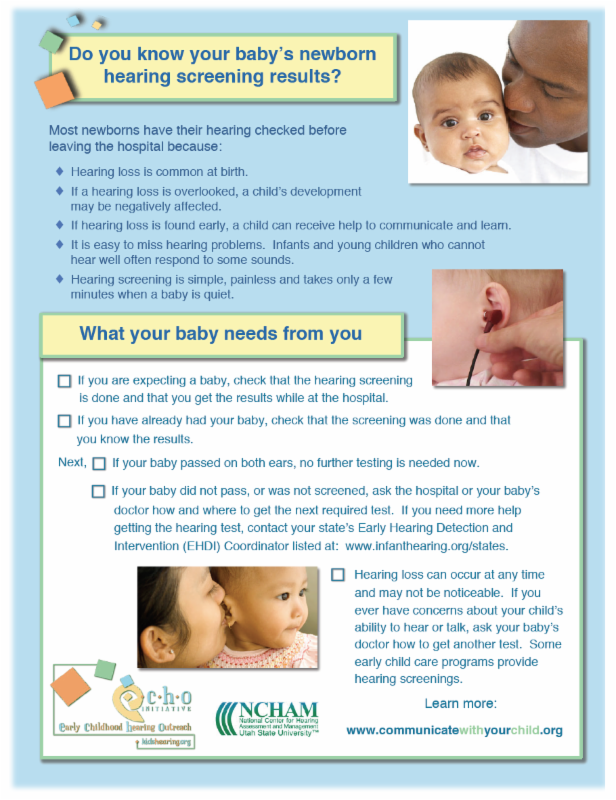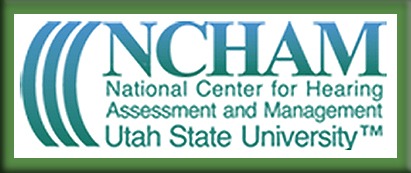ECHO Initiative Events
Tuesday, Oct. 15, 2019
2-3 p.m. ET
* * * * * * * * * * *
Tuesday, Oct. 22, 2019
2-3 p.m. ET
* * * * * * * * * * *
Tuesday, Nov. 5, 2019
2-3 p.m. ET
* * * * * * * * * * *
Thursday, Dec. 5, 2019
2-3 p.m. ET
* * * * * * * * * * *
Additional Training Opportunities:
Link to Previous
Recorded Webinars:
If you've missed any of
our other previous webinars,
|
|
|
|
I
f your program is new to OAE screening, or if you have added new staff who need instruction on OAE screening practices,
where staff can view instructional video modules
and access the
corresponding resources.
|
|
Quick Links
|
|  Find more helpful hints from previous issues of Probes and Tips and many other
resources at: www.kidshearing.org |
|
|
 |
|
Help Families Understand Hearing Screening & Language Development
Hearing screening provides a great opportunity to talk with families about a child's language development and learning. Most parents are not aware that a baby or young child could have a hearing loss, or how that could affect language learning. That's one of the main reasons it is important for a child's hearing to be checked at birth, and again periodically during childhood. Here are a few resources that can be helpful in explaining hearing screening to families.
Programs working with expectant mothers and parents of newborn babies can start with this simple
handout on newborn hearing screening and follow-up
.  All babies should have a hearing screening shortly after birth, and parents should know the results and what to do if their baby did not pass. If parents are curious about how a newborn's hearing can be checked, Giving Your Baby a Sound Beginning is a 6-minute video that explains the process. Programs serving infants and young children will also want to review each child's health record to verify that the child either passed the newborn screen All babies should have a hearing screening shortly after birth, and parents should know the results and what to do if their baby did not pass. If parents are curious about how a newborn's hearing can be checked, Giving Your Baby a Sound Beginning is a 6-minute video that explains the process. Programs serving infants and young children will also want to review each child's health record to verify that the child either passed the newborn screen
(or re-screen), or was evaluated by a pediatric audiologist. Program staff should assist families in taking any needed follow-up steps and report outcomes back to the State's Early Hearing Detection and Intervention program responsible for tracking newborn hearing screening outcomes.
Program
s screening infants, toddlers and young children beyo
nd
the newborn period can use this
handout on periodic scree
ning as one way to let parents
know that this service is being
provided.
If you conduct Otoacoustic Emissions (OAE) screening and parent
s are curious about how an infant's or toddler's hearing can be screened,
even before the child can respond reliably to prompts, encourage them to watch the 6-minute Introduction to OAE Screening video. To see examples of how screening results can be communicated to parents in person and in writing, open the ECHO Implement OAE Screening page, look in the Implementation Tools column, and click on Share Results: Letters & Scripts.
As you share hearing screening results, it can be a good time to have a conversation with family members (which can include siblings, grandparents, etc.) about the important role they play in stimulating a child's language development. The
simple games and songs of childhood are more than just fun. Through these interactions, a child gains receptive and expressive language skills. As family members talk to the child during feeding and bathing routines, they are helping the child to form relationships and a larger understanding of the world around them. Direct families to additional ideas on how they can continue to build a child's language skills.
|
 |
Have any other suggestions for how programs can explain hearing screening and language development to families?
If so, let us know at:
And, as always, share
www.KidsHearing.org
with anyone you think would benefit from our resources.
|
|

2615 Old Main Hill
Logan, UT 84322
|
|
|